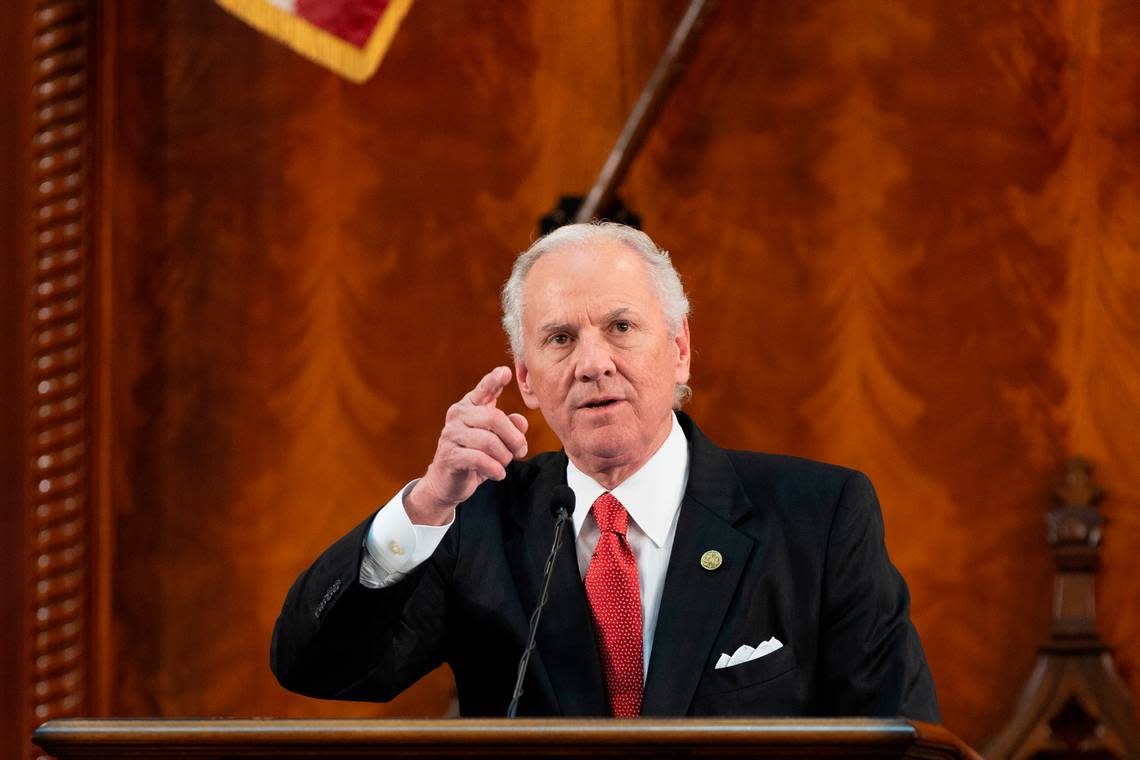‘We can’t wait another day’ McMaster says on merging SC state health care agencies

- Oops!Something went wrong.Please try again later.
Gov. Henry McMaster called on lawmakers Monday to take up a health care agency reorganization plan when they return next month, even though the specific topic is not part of an agreement on what the General Assembly can work on when they return.
Speaking to reporters to discuss the end of the legislative session, McMaster said the merging of six health agencies and the creation of the executive office of health and policy needs to be done this year.
The state’s health care system has been characterized as one of the most fractured in the country.
“Hopefully, we’ll find a way to get that bill into the conference and solve this problem,” McMaster said. “We can’t wait another day.”
The bill was stopped last week when the official legislative session ended Thursday and a hard-line conservative House member objected to its consideration in the last hour of session.
McMaster would not put blame on any particular lawmaker or group, despite the House Freedom Caucus taking credit for killing the bill for the year after they characterized it as creating a health czar.
“We’re gonna kill bad legislation, fight for our constituents who sent us up here, and you know what, I’m very glad that we won on this issue right at the end of session. It’s a huge win for the Freedom Caucus and for conservatives,” said state Rep. Adam Morgan, R-Greenville, who chairs the Freedom Caucus and is running for Congress. “We won. We killed the health czar bill. (It’s a) huge win for the Freedom Caucus.”
But House and Senate leadership has said the bill remains a priority and can be brought back up next year.
On July 1, the Department of Health and Environmental Control will split into the the Department of Public Health and the Department of Environmental Services.
In hopes of improving communication and coordination between health agencies and improving services, lawmakers wanted to merge the new Department of Public Health with the departments of Alcohol and Other Drug Abuse Services, Disabilities and Special Needs, Health and Human Services, Mental Health, and Aging to create the Executive Office of Health and Policy.
Several of those agencies are already slated to move a health campus in Cayce.
On the last days of session, the House passed a health care agency restructuring bill getting past procedural moves, including asking for the clerk to read the entire bill aloud, to delay its passage. Eventually that request was rescinded and the House passed the bill sending it back to the Senate. Senators then amended the legislation Thursday with less than an hour before adjournment to include medical freedom provisions that could have addressed concerns made by the Freedom Caucus.
When it came back to the House, and members tried to bring it up for immediate consideration, state Rep. Josiah Magnuson, R-Spartanburg, a member of the hard-line conservative House Freedom Caucus, objected and stalled the bill and kept it from coming to a vote and prevented a conference committee from being formed.
Lawmakers may have options to bring the health agencies restructuring back up sooner rather than next year.
The General Assembly is scheduled to be back June 5 to hold a state Supreme Court justice election and is expected to be back at least two more time later in June to complete work on the budget.
All legislation that didn’t get passed both chambers by 5 p.m. Thursday died. Only, the judicial election, bills dealing with the annual budget or are in a conference committee can now be brought up, under a Sine Die agreement, which designates what lawmakers can debate and vote on after the last day of session.
That agreement can be changed with a two-thirds vote of both chambers and potentially allow for debate on the health agency restructuring.
Lawmakers also could potentially attach a proviso the budget if those finalizing the spending plan receive free conference powers, a move that requires a two-thirds vote of both chambers.
The legislation has overwhelming support. It passed the House in a 98-15 vote and the Senate in a 44-1 vote.

